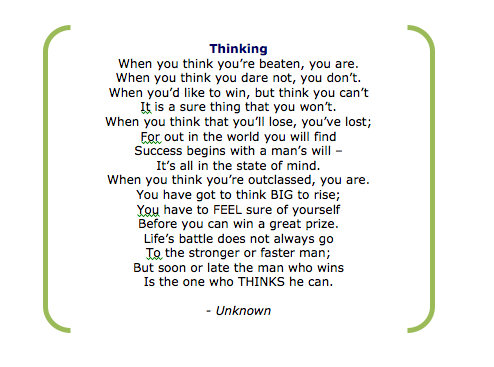 Some conversations tend to be one sided. That is some styles like to do all the talking, and some styles just don't like talking at all! So how do we overcome this when managing a group of people? Here is the answer... It is called a WHAT I FEEL LIKE SAYING process or a WIFLS. This process is great to use when starting and finishing a meeting, or for using when there is conflict in a team that must be cleared or when a team needs to align on something. The process has certain steps and each step uses specific words or statements the person speaking must use. It is a positive ritual that any group can gain value from. Clearing the mind of clutter Each time a group meets, go through this ritual to help everyone clear what is on their mind, so they can be more present and engaged with the group, and to feel heard by other people. Go over the rules in advance when using the process for the first time. It may take a few times for people to learn to trust the process. Rules of the WIFLS process NO ONE ELSE CAN SPEAK or RESPOND when the Person is sharing. Then it will go quickly and the leader will be able to see if anything needs to be handled outside of the group meeting. Person #1 starts and says... “What I feel like saying is...."____ " They share for a minute or two whatever is on their mind. Whether it is good, bad, or indifferent. It can be anything from... “I burnt the toast”, or “I got cut off on the freeway…” or “My kids are so great – today I got…” or “I’m ready to have a melt down I feel so ……” And NO ONE SAYS A WORD TO THEM. Everyone else just LISTENS. Then the person speaking finishes up by saying, "And that's what I feel like saying." Group says... "Thank you (name)" The person that was sharing turns to the person on their left and says... "And what do you feel like saying, (name)?" Person #2 says... "What I feel like saying is...... _______" "And that's what I feel like saying." etc., around the group. WHY THE WIFLS PROCESS IS SO VALUABLE TO DO AT THE BEGINNING OF EVERY TEAM MEETING: Even though to some it will feel like it takes too much time, this process is a very good investment because it actually gets a team of people into alignment and understanding what’s going on with each other so they:
After everyone has shared, Leader can judge if the energy is still high and ask if the group wants to go around another time. Or can ask if anyone still has a “burning share.” If someone has shared something disturbing or upsetting to them or someone else in the group, the leader can seek them out later and ask if they may speak with them about the issue. But if the person says, NO, then they should honor the space agreed to not to discuss anything more about it. This process is a version of “clearing” processes and is taught in Money & You®. For questions or more explanation about how to apply and use this process, CONTACT Sandra Davis
2 Comments
 We all have an Ego or put another way, the Ego has us! You know that voice in your head that is always telling you things. Things like "if you are not right about this one you are going to look stupid" Or "the boss will think I'm great if I make him look wrong about that"! Here are six games that the Ego plays to survive in the world, or should I say survive in YOUR world! 1. Dominating others Domination of others is a natural game for the Ego to Survive. We normally dominate others by saying we are parents, teachers, spouses, leaders, employers, officers, head of the family, etc. Our position as parent, a teacher or a leader gives us the excuse to dominate others frequently. Most often in the pretext of concern for the organization we are working for, or as concern for the other person, our mind subtly allows us to dominate others. In many of our relationships, more often that not, we are unaware of this subtle interference of this Ego. 2. Refusing to be dominated We need to understand that it is the Ego that refuses to be dominated by others. This is another subtle and dangerous game that the Ego plays. In the absence of Ego, we would happily surrender to domination by others. But most often we do not like to be dominated in any way. Because we are afraid of what might happen – the mind says “I am feeling unsafe here I need to leave”, or “I must fight to survive being dominated”. It is known as flight or fight. Put another way, in order not to feel dominated we dominate or we withdraw from the other person that is trying to dominate us. This game is nothing but the Ego playing inside us. 3. I am Right Our Ego always wants to prove that 'we are right'. Again and again, we argue or try to prove a point or to justify our thinking to be right. We have many explanations in order to prove our “rightness”. Start to become aware of this Ego Game when we try to prove that we are right. Why should we ever prove we are right? If we are really right, there is no need at all to prove it. Nature or the Universe will prove it for us in some way and at some time, once we become aware of this game of Ego playing out inside us. 4. You are Wrong This is the other side of the above coin. Just as we like to prove we are right, we also like to prove that the other person is wrong. This is nothing but the Ego playing its game inside us. 5. Survival Ultimately, the Ego in order to survive inside us will simply lead us into thinking that it is playing none of the above games. Ego will always justify itself. The mind will lead us to think that we are not at all bound by Ego, or that we are absolutely right in our egoistical approach to life - when we are in relationships, when we are parenting our children or when we are managing people at work. 6. Cover-up Very often we cover up our Ego by commenting about others or finding fault with others. Become aware that it is the Ego and the hurt we have felt in the past, that is finding fault with others. Here we are not talking about practical and functional faults. We are talking about characteristic judgments and blaming or labeling others. Is EGO Good or Bad? Is it possible to be free of the EGO and still function in the world? Many of you might be sitting with questions such as, without Ego is it possible to survive in this modern world? Or if we are not egoistic how can we still be successful or be a part of this competitive world that we live in? Well the good news is yes you can! In fact if you were free of the ego, you would be extremely successful. Let me explain, as there are two distinctions here to understand. We have to distinguish between The Self and The Ego. The Self has an ambition - the will to fight it out or the will to achieve. The Ego on the other hand makes you positional. When you become positional, you do not understand what the other person is talking about. Or even have the willingness to listen to what they have to say. There is no listening. Hence, there is no learning. Therefore you have every chance of losing. You have every chance of losing a customer or client. You have every chance of losing a relationship. You have every chance of losing a good insight. You loose the opportunity of people contributing to your life in some way. Here, we are not talking of the Self. The Self must be there if you want to achieve success in the world. We are not talking about that. We are talking of the Ego and its games, which is harmful in the process of achieving success. So, you must learn to distinguish between the two. What does taking a position look like? Let me give you an example. "You make a choice and take a stand that a certain kind of medicine is good for you. Then somebody comes and convinces you that this may not be the right medicine, they say, “why don't you explore homeopathy instead?” You say ok, I will explore that. This is being non-positional. That is you had a certain point of view, but now you are prepared to change it to another one. But then along comes your Ego and interferes, saying “no, no, I can not be wrong, if I agree to what she says I will feel inferior, I will be wrong, and she will feel superior, therefore, no, no, my choice is the only right one”. Then ego plus position becomes positional. There is no movement in that choice. Such people will never learn in life. So, a person must become flexible and be able to change their position to a different point of view. Ego plays six games; I am right you are wrong, wishes to dominate, and refuses to be dominated. And if these games add to your position and you become positional you are going to enter into some form of conflict – with your spouse, your child a co-worker or a friend. This conflict happens when you become positional. Take a father and a son. The son must realise that his father belongs to another generation. And the father must realise his son belongs to another generation and that his perceptions are different, and he must be willing to accommodate that. If the son stands to his position because of his Ego, he will think 'father is dominating me' and the father will think 'he is refusing to be dominated'. Then there is a conflict. Once you become aware of these games, automatically the mind will become non-positional. What is the difference between management and leadership?
And when is it appropriate to manage or lead your staff? The increasing rate of change today in a business environment is placing the emphasis on individuals to step more into a leadership role. Gone are the days where you could just turn up for work and manage your team. Today employees are looking for a work environment that gives them a sense of safety, ways to be creative and also a sense of community or team. Whereas in the past, managers were expected to maintain the status quo in order to move ahead, leaders today must be visionary, being both learners and teachers at the same time. Leadership requires you to have a strong sense of ethics and you must be able to work towards building and teaching integrity in your business. The biggest difference between being a manager and a leader is in the way you motivate, inspire and communicate with your staff. Many business owners by the way are both. In small businesses owners often need to manage the day to day operations, as well as lead and inspire a team to keep morale and productivity up. Holding and translating to staff the bigger picture for growing the business and for achieving strategic goals, requires leadership thinking. Personality style and traits of a leader… If you are looking to develop your leadership skills first you must understand and become aware of what traits, attitudes and behaviour a leader would be able to demonstrate. Then look at developing these within yourself. In 1954, Raymond Cattell, developed and designed the Leadership Potential equation, leading the way in the field of personality assessment. I have taken from Cattell’s Leadership Potential equation a number of leadership and personality traits I feel are important to have as a leader, these are:
Where to start when developing your leadership qualities… Some of you might be thinking that the list seems rather long and how can one person have all of these traits within them? Leaders are rarely (if ever) born. Circumstances and the experiences we have in life, play a major part in the developmental process of any leader. To become more of a leader, work on developing those traits in your personality that you feel are not present or that you think are your weakest. Personal leadership traits play a major role in determining who will and who will not be comfortable leading others. However, it's important to remember that people can adapt their style and change. It will also depend on your beliefs relating to leadership. Some years ago in a conversation with a colleague I was told that I would make a great leader. This surprised me as I had never thought of myself as a leader. Further on in the conversation I uncovered a number of beliefs that I had that related to being a leader. To me if you were a leader you would either eventually be put in jail (Neilson Mandela) or killed (a number of presidents around the world)! Stepping into a leadership role definitely was not something that I believed to be safe! However once I become aware of these beliefs I was able to change them. I would encourage you to sit down somewhere quiet. Take a few moments to think about some of your beliefs (what is true for you) you might have that would stop you from becoming a leader, and write them down. These thoughts are statements, usually your first ones, before you start to rationalize your thinking. And they don’t necessarily have to make sense either. At a rational thinking level I also believed that not all leaders were put in jail or killed. The mind both unconscious and conscious does not rationalize what is real or not real. It just believes what you tell it! And you create your life from these thoughts. So accessing what you believe leadership to mean first is critical in the change process. Once you have your list then you can start to become aware of what you believe to be true and choose to change how you think. Some styles find leadership easier than other styles… In the DISC psychometric profile that I have spoke about in a previous article, people with the more dominant style “D” find it easier to lead as they naturally have traits of problem solving, can think of the big picture and can make things happen. However these individuals still need to develop their people skills and empathy for others, qualities a leader would have. And they can at times be very controlling, and find working in a team rather challenging. For instance, if you have all of the basic leadership traits but do not consider yourself very much of a "people" person, taking classes or reading books on empathy could be away of developing this trait. On the other hand, if relating to others has always come naturally to you, but you have trouble making decisions, learning how to develop your problem solving skills could help develop the trait of problem solving. Once you have written your list of what stops you from becoming a leader, then look to see what traits are missing in your style based on Cattell’s list or that are the weakest. And then design your development goals. These goals could include participating in some personal development programme, reading books, working with a life/business coach or finding a mentor. Remember a development goal must be able to give you an awareness of what is stopping you from becoming a leader. It must be able to give you support or new information that creates change in your attitude, beliefs or behaviour. So at the end of the day leadership comes from within, and starts with a choice. Some people may be thrown into the leadership role and some may choose it willingly. Whether you choose to manage or lead your staff is up to you. In my experience as a business owner, facilitator and coach, today people are looking for leadership more than ever. I have learnt that being a leader can leave one with a sense of making a difference, and pride in knowing that you have contributed to the achievement of others. The first step to becoming a leader is to become aware of what you are thinking. I would like to leave you with a poem written by an unknown author that describes a part of the leadership journey beautifully. Enjoy… |
AuthorSandra is very passionate about supporting others to be the best they can be through sharing her stories and experiences she has gained along the way... Categories
All
Archives
March 2022
|
Partner with PeopleSmart
© Copyright 2024 - PeopleSmart Enterprises NZ Ltd. All Rights Reserved.
Privacy Policy


 RSS Feed
RSS Feed